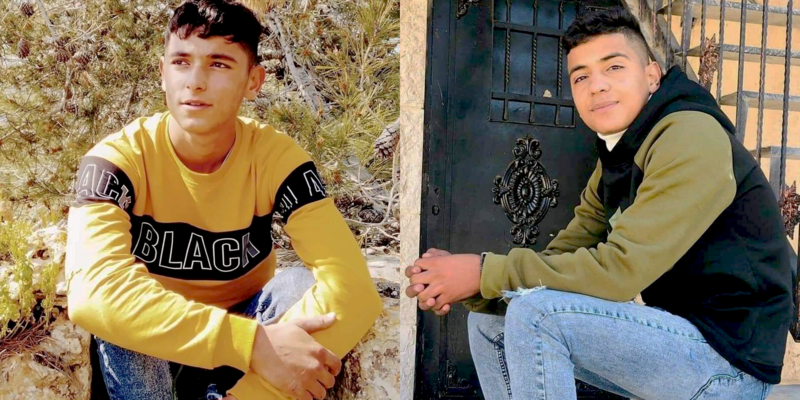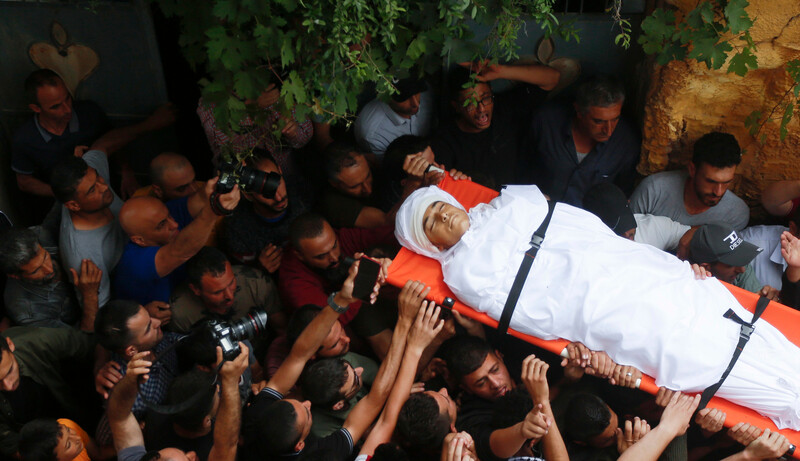Rights and Accountability 18 June 2021

Ahmad Bani-Shamsa, left, was shot by Israeli forces on 16 June and died from his wounds the next day. His friend, Muhammad Hamayel, right, was killed by Israeli fire on 11 June.
Israeli occupation forces killed the fourth Palestinian from the occupied West Bank village of Beita since May as settlers steal nearby Palestinian land.
Israeli forces shot 15-year-old Ahmad Zahi Ibrahim Bani-Shamsa with a live bullet to the head on Wednesday afternoon during ongoing confrontations with villagers protesting the Israeli theft of nearby land.
Bani-Shamsa and his 16-year-old friend Mahmoud had gone to a hilltop on the outskirts of the village to set some tires on fire, according to a field investigation by Defense for Children International Palestine.
Israeli forces were deployed some 300 meters away.
The boys approached an Israeli soldier and started chanting on a megaphone about their friend Muhammad Said Hamayel, a 16-year-old boy killed by an Israeli bullet to the chest last week.
A soldier then fired a single live bullet, causing the boys to flee for cover.
The boys returned to the area shortly after. The same soldier “assumed a kneeling sniping position” and fired approximately 10 bullets at the boys, DCIP said.
Bani-Shamsa fell to the ground as a bullet entered one side of his head and exited the other.
The boys were some 100 meters away and Bani-Shamsa “did not present any threat to Israeli forces at the time he was shot,” DCIP said.
When his friend Mahmoud approached him and tried to help him, the soldier fired again.
Minutes later, a Palestinian from Beita arrived and helped carry Bani-Shamsa to a car which took him to the hospital.
The 15-year-old died of his injuries at dawn on Thursday. Bani-Shamsa is the ninth Palestinian child to be killed by Israeli occupation forces in the West Bank this year, according to DCIP.
Bani-Shamsa and Hamayel were friends, and were killed one week apart.
Two other Palestinians, Zakaria Hamayel and Issa Barham, have been killed by Israeli fire in Beita since the beginning of May. Israeli forces fatally shot Zakaria Hamayel on 28 May on Jabal Subeih in Beita village.A former prisoner of the occupation, Hamayel was an Arabic teacher in the Jerusalem-area village of Bir Nabala.
New Jewish-only colony
Palestinians in Beita have been resisting a new Israeli colonial outpost named Evyatar built on Jabal Subeih.
Settlers established Evyatar in May. It is located on land historically belonging to the Nablus-area Palestinian villages of Qabalan, Yatma and Beita.
The outpost is built to prevent a connection between the villages.

Mourners carry the body of 15-year-old Ahmad Bani-Shamsa on 17 June after he succumbed to wounds sustained the day before in Beita village near the occupied West Bank city of Nablus.
APA imagesIsraeli forces blocked the roads leading to Beita on Friday morning to quell resistance against Israeli settlers.
More than 380 Palestinians in Beita and Beit Dajan – another Palestinian village near Nablus – were injured by Israeli weapons, including 55 by rubber-coated steel bullets on Friday, according to the Palestine Red Crescent Society.
Israeli forces fired dozens of tear gas canisters at protesters, including journalists.
Israeli tear gas canisters landed in a warehouse where vegetables are stored, causing it to catch fire, according to local media:
Rapid expansion.
Outposts are typically built by settlers without permission from Israeli authorities, in order to create facts on the ground.
However, according to Haaretz this settlement is being built with the backing of the Samaria Regional Council, an official Israeli government body – highlighting how in reality the settlers and occupation authorities work hand in glove.
Additionally, Israeli soldiers helped settlers build structures in the outpost, Tel Aviv daily Haaretz reported. The Israeli army said the soldiers did not act with the approval of commanders, according to the newspaper.
While technically illegal under even Israeli law, the state often recognizes the settlements retroactively and issues building tenders.
All of Israel’s settlements in the occupied West Bank, including East Jerusalem, and Syria’s Golan Heights are illegal under international law and their construction is a war crime.
Dozens of settler families live there already, and the colony is rapidly expanding to include a school, daycare center, synagogue and paved roads.





Comments
free for all murder
Permalink Carol Scheller replied on
This is why the idea of visiting Israel puts me off: I might be taking the bus or walking down the street with someone who has killed an innocent, often very young, person with total impunity. I would scrutinize the faces of any young Israeli dressed in civilian clothes and wonder what he or she had done in the occupied territories. This was my instinctive reaction during my first visit to Germany many years ago, wondering what older people whose paths I crossed had done in the second World War. The army does a great wrong to its recruits by making killing a sport with no accountability attached.
Human Rights for Palestinians
Permalink Claudio Hidalgo replied on
Human Rights for Palestinians !!!
This killing must stop
Permalink Abe Hayeem replied on
Sadly, with such deliberate killing of Palestinian youth who protest against the stealing of their village land by terrorist settler communities, aided and abetted by Israel's occupation army, this must classify as incremental genocide that has been going on since 1947, and also previously in terror attacks by the Irgun and Lehi underground. This is being done with impunity, knowing the West will not take action against it. But it must and it will, this tragic killing and maiming of these wonderful youth who are brave enough to resist, must end, and all those who carry out these land grabs and sharpshootings taken to the ICC.
Every israeli is guilty
Permalink amlac replied on
israeli’s have a choice to not participate in making lives of Palestinians a living hell 24/7. Simple: refuse military service vs Palestinians. And yes, go to prison.
People outside israel: never set a foot in israel. Do what you can to avoid anything made in israel.
Another tip: read Charlotte Dennett’s book that explains how oil & gas pipelines are the centre of every country’s struggle in the Mid East.